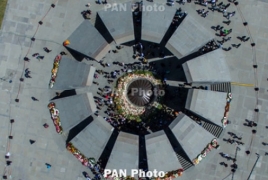Turkish minister, French lawmaker clash over Armenian Genocide April 13, 2019 - 11:49 AMT PanARMENIAN.Net - Turkish Foreign Minister Mevlut Cavusoglu clashed on Friday (Apr 12) with a French lawmaker over the commemoration of the "Armenian genocide" in a heated exchange that prompted the French delegation to walk out. French President Emmanuel Macron in February announced France would hold a national day on Apr 24 to commemorate the Armenian genocide, drawing criticism from Ankara. During a meeting of the NATO parliamentary assembly in Antalya in southern Turkey on Friday, Turkish parliament chief Mustafa Sentop lashed out at France's decree to establish the commemorative day, accusing Paris of "manipulating history." He also referenced massacres committed in Algeria when it was still a French colony and in Rwanda whose government accuses Paris of being complicit in the 1994 slaughter there. Attending the meeting, French lawmaker Sonia Krimi, from Macron's LREM party, criticised Turkish comments saying she was shocked. But that provoked a sharp response from Cavusoglu. "In terms of genocide and history, France is the last country to be giving lectures to Turkey, and we have not forgotten what happened in Rwanda and Algeria," the minister said. "You can keep trying to look down on us, but we will keep putting you in your place." Krimi and the French delegation left the room in protest over Cavusoglu's remarks. "When the arrogant @MevlutCavusolgu gives you lessons on arrogance and politeness, arrogantly and without any respect," she wrote on Twitter referring to the incident. Turkey's presidential spokesman Ibrahim Kalin hit back posting on Twitter a story from state news agency Anadolu about "dark stains in French history." "Neither their colonial past nor their self-centred present guarantees their moral superiority," he wrote. Armenians commemorate the Genocide on Apr 24 - the day in 1915 when thousands of Armenian intellectuals suspected of harbouring nationalist sentiment and being hostile to Ottoman rule were rounded up.  The Armenian Genocide The Armenian Genocide (1915-23) was the deliberate and systematic destruction of the Armenian population of the Ottoman Empire during and just after World War I. It was characterized by massacres and deportations, involving forced marches under conditions designed to lead to the death of the deportees, with the total number of deaths reaching 1.5 million. The foreign ministers of Armenia and Azerbaijan, Ararat Mirzoyan and Jeyhun Bayramov, have arrived in Washington. The CSTO budget for the current year requires adjustments due to the refusal of Yerevan to pay their share of contributions. Six total incidents have burned 19 old-growth trees. Friday night 8 trees were torched along the beautiful main entrance. The EU does not intend to conduct military exercises with Armenia, Lead Spokesperson for EU Foreign Affairs and Security Policy Peter Stano says. Partner news |